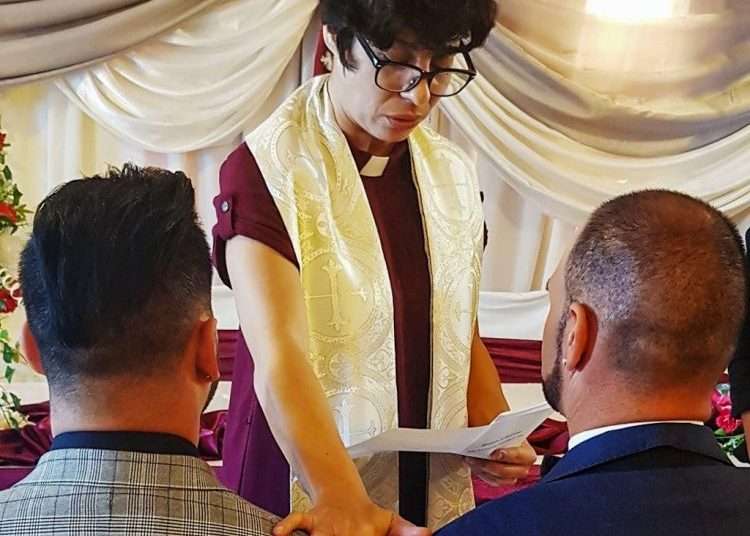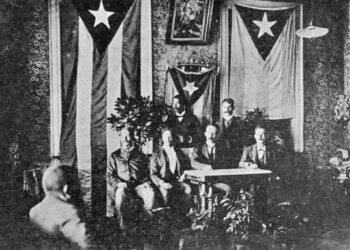The draft of the new Family Code has caused controversy within Cuban society, ever since the document was made public so that, according to the government’s design, the population give their opinion on the text and enrich it before its approval.
The opinions range from outright opposition by religious communities and conservative groups that reject unions between people of the same sex, to the distrust of homosexual couples in disagreement with having their rights submitted to a referendum.
An Associated Press (AP) report includes the opinion of the couple made up of Adiel González and Lázaro “Lachi” González, two men who anxiously await the possibility of marrying dressed in black on the seashore and who, according to the U.S. agency, are fervent Christians and do not want to adopt children.
It also reproduces the opinion of Pastor Moises de Prada, who does not agree with the union of two people of the same sex and who, like many of his parishioners, shudders at the idea of surrogate pregnancies.
From their apartment in Matanzas, Adiel and Lachi closely followed the evolution of the regulation that, according to the Constitution approved in 2019, must be taken to a plebiscite.
The first, a 31-year-old graduate in languages and a theologian, thinks that the popular consultation could enrich the text, although according to him submitting it to a referendum is not correct. “The rights of a minority would be submitted to the vote of a heterosexual, heteronormative majority,” said Adiel, quoted by AP.
Díaz-Canel: next referendum will not be on same-sex marriage but on families in Cuba
“God does not have stepchildren, therefore, we are all God’s children and what Adiel and I do is lead a life with love. We are in a correct life and we are happy,” Lachi explained. Both work at the Evangelical Seminary of Matanzas — about 100 kilometers from the capital —, an institution created in 1946 by several Protestant denominations.
The draft of the Family Code was drawn up by a committee of 30 experts and contains more than 480 articles, which try to reflect the diversity of institutions and family life in Cuba today, seeking to resolve possible conflicts.
Among the novelties of the text is a more prominent legal role of grandparents, the possibility of establishing premarital agreements on the future of the heritage, negative consequences — for example, when distributing assets — for those guilty of committing gender-based violence, or the alternative for parents to agree on the order of their children’s surnames. Also, among other aspects, the concept of custody disappears and is replaced by that of “parental responsibility,” while the minors are granted gradual autonomy over their decisions or greater recognition of the de facto union.
But the definition of marriage, which opens the door to the union between people of the same sex for the first time on the island, the possibility of adoption for these couples and “solidarity pregnancies” immediately came to the fore of the debates.
Moises de Prada believes that the new code will not represent any benefit. Quoted by The Associated Press, the superintendent of the Pentecostal Assemblies of God — which includes more than 2,000 temples in Cuba and, according to its directors, represents a million people —, the pastor affirms that the family “conceived as it is structured in the word of God is the one that was agreed between a man and a woman and the children that are derived or that can later be adopted.”
The opposition to same-sex marriage does not come only from churches of Protestant denominations, but also from sectors of Afro-Cuban religions such as Santeria, Catholics, Spiritualists, Muslims and even alleged atheists, although evangelicals have been very active in expressing their position.
In 2018 and 2019 some Christian churches publicly showed their reaction to unions between people of the same sex, through a campaign that bet on what they call “the original family.” At the time, Christians challenged the government, openly calling to vote against another plebiscite on that occasion to approve the Constitution, which among other things does not recognize conscientious objection, the report indicated.
“As a church we have a family pattern,” Pastor Julio César Sánchez, secretary of the Assemblies of God, told the AP. He considered the alternatives to the heterosexual model as “the result of sin” and for him the explanation that these unions are a reality is not valid. “The argument of regularizing what exists is not valid, because murder also exists…this does not mean that it is good,” he said.
In the streets, the will of people is divided and although a large group of people approve the norm, others express distrust.
“There are people who are going to be against same-sex marriages, but I think it’s normal,” said 68-year-old retired Alberto Dausá, consulted at random by the agency, while Carola Reyna, a 25-year-old housewife and mother of two children, opined that “children (adoptions) should be left out of this.”
Meanwhile, the government strives to discourage passions by insisting that religious logic should not impede the legal regulation that will apply to 11 million Cubans, believers or not.
“We are proposing a new Family Code, with all the institutions of family law,” Minister of Justice Oscar Silveira Martínez said to AP. “The Code does not construct social realities, it tries to provide legal solutions, protection of those social realities that exist.”
AP/OnCuba










